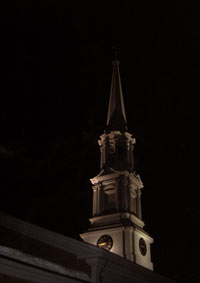"To Be Counted" by Rev. Tom Schade

The affirmation of my ministry at First Unitarian Church, as expressed in the resolution to “promote” me or to “designate” me as the eleventh minister of the Church is very gratifying. When I started on my path to Unitarian Universalist ministry in 1995, it felt like a risky adventure. To have the congregation I serve tell me that they have appreciated the work I have done feels good.
The act, “promoting me to be the 11th minister” is symbolic. It brings no change in responsibilities or rewards. It is not a new office in the church, and it makes no presumptions about the future. I did not think it to have by-law implications, but some wondered about that question.
What the action says to me is that I am now to be counted as among the ministers of this church, and not just listed among the numerous assistant ministers and associate ministers that have come and gone, usually quite quickly, over the 225 years of our history. I entered into the ministry with a long view; I wanted to do what I could to preserve and to advance the ways of the free church. To be counted as one of the line of ministers at one great church of that tradition tells me that I am reaching toward my life’s goals. Is it vain on my part to be concerned about where I will be listed in the as-yet-unwritten second volume of First Unitarian Church’s history? Probably. I am not immune to the sin of pride.
Not counting interims, and associates, and assistants, First Unitarian Church has had just ten ministers in its history. None were perfect.
#10. The Rev. Barbara Merritt, 1983-present. The first female minister of the church now presides over a period of great growth and orderly change. The church has become more theologically broad than ever, and she encourages a deep commitment to personal spiritual practices. Ms. Merritt has done what few UU ministers in this era have been able to do: to successfully maintain an intergenerational church as the baby-boomers come into its leadership.
#9. The Rev. Christopher Raible, 1976-1982. Ministering during a period of intense cultural, sexual and moral questioning, Mr. Raible was a civic activist. He divided the church. In the midst of personal crisis, he left after our shortest ministry.
#8. The Rev. Wallace Robbins, 1956-1976. Our minister during tumultuous 60’s and 70’s, Mr. Robbins was a traditionalist and a committed Christian. While Unitarianism and Universalism merged in 1961 and headed in an atheistic and humanist direction, Mr. Robbins resisted that trend. He preserved the theistic worship tradition of our church, including its seriousness, prayer and scripture. As our church is different than many other UU churches, much of the credit is due to Mr. Robbins.
#7. The Rev, Walter Kring, 1946-1955. This Presbyterian Army chaplain, turned Unitarian, ministered during the postwar years and into the 50’s. Walter was a theist. He helped found the Worcester Center for Crafts. The author of the first volume of our history, an accomplished potter, a Melville scholar; he left First Unitarian for All Souls, in New York City.
#6. The Rev. Maxwell Savage, 1919-1946. One of the most successful of the ministers, Mr. Savage led the First Unitarian through a period of great growth and vitality. During his ministry, First Unitarian merged with the Church of the Unity, built Unity Hall, and became the largest Unitarian church in the country. In 1938, the sanctuary portion of the church was destroyed in a Hurricane, and rebuilt.
#5. The Rev. Edwin Slocomb, 1912-1919. During his relatively short ministry, Mr. Slocomb led the church through a transition to the modern organization of the church, as a democratic voluntary association: with by-laws, an annual canvass, annual meetings of the congregation and formal membership. Mr.Slocomge was an agent of change.
#4. The Rev. Austin Garver, 1882-1910. Mr. Garver ministered during one of the Golden Ages of the Church. First Unitarian was large and composed of socially prominent persons at this time. Mr. Garver was instrumental in founding numerous Worcester institutions, including building the Art Museum.
#3. The Rev. Edward Hall, 1869-1882. Mr. Hall served in the post Civil War era. He was a popular preacher and quite active in national denominational affairs. He answered the call to the First Parish of Cambridge after 13 years here in Worcester.
#2. The Rev. Alonzo Hill, 1827-1869. Rev. Hall started as the assistant to Aaron Bancroft, our founding minister and served for 42 years. For twelve years, both he and Mr. Bancroft were active ministers. It was during Mr. Hill’s ministry that the present church building was built. Mr. Hill served for 25 years on the Worcester School Committee.
#1. The Rev. Aaron Bancroft, 1786-36. Mr. Bancroft was our founding minister. He was the first minister called to a church created for the specific purpose of hearing “liberal” (as opposed to Calvinist) preaching in the United States. The first President of the American Unitarian Association. Served for 50 years, although much of his duties in the latter years were carried by his colleague, Mr. Hill.
Of course, these ten ministers were called to serve one congregation, which is a continuous body, whose members live with and remember many ministers. There are members of our congregation who joined while Mr. Savage was minister. Congregations and ministers co-create each other, for both our shared accomplishments and shortcomings. To be counted as among these ministers is a great honor, and a great responsibility and a great calling. I pray to be worthy to be among that number, and to be a worthy steward of your trust.


0 Comments:
Post a Comment
<< Home